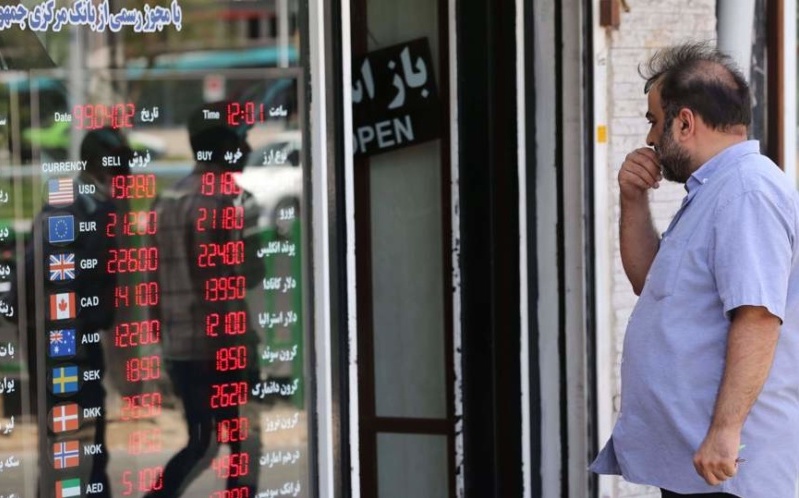A man looks at exchange rate at a currency office in Tehran, Iran, June 22, 2020
UPDATE, OCT 2:
The Iranian rial closed at 300,000:1 v. the US dollar on Thursday.
The currency markets are closed on Friday for the Iranian weekend.
ORIGINAL ENTRY: Continuing its historic plunge, the Iranian currency closes on the 300,000:1 mark v. the US dollar.
The rial stands at 299,700:1 at 12:45 p.m. Tehran time on Thursday, a fall of 2%.
The currency — which stood at an already-historic low point of 45,000:1 in early 2018 and 150,000:1 in March — sank through the 275,000:1 level on September 22.
The Iranian economy is beset by long-term problems with production, investment, trade, and employment. They have been compounded by comprehensive US sanctions, imposed in November 2018 and extended in recent months.
Iran’s oil exports have been slashed by up to 95% since April 2018, with President Hassan Rouhani admitting earlier this month that revenue has fallen more than 80%.
Total exports are at their lowest point in more than a decade with China, Iran’s largest customer, amid a 62% drop in the past year. Exports have also fallen sharply with Turkey (75%), Gulf States (almost 60%), and India, South Korea, and Japan (up to 95%).
Rouhani Ignores Currency, Defies Trade Drop
President Rouhani ignored the latest currency news in a Cabinet meeting on Wednesday, but he did declare that the Industry Ministry is on the frontline of an “economic war” with the US.
Referring to the Supreme Leader’s declaration of the Iranian year as “A Surge in Production” — “the most important priority is in making [it] happen” — Rouhani defied the trade statistics:
Despite the outbreak of Coronavirus, these figures show the significant growth of the country’s industrial sectors, including steel, petrochemicals, home appliances and automobiles.
It is very important for the dear people to know that despite all the difficulties and the pressure of sanctions, our production sector in the fields of agriculture, industry and services has grown significantly.
Rouhani did betray his concern about the situation in the observation, “Oil and gas exports and oil condensate in the past years provided the currency needed by the country, but now that we are facing problems, this task is on the shoulders of non-oil exports.”
But he was soon using the first Presidential debate between Donald Trump and Joe Biden to shift attention:
Americans themselves are in a very difficult situation. Last night, if some of our people saw the debate or read it in the press and cyberspace today, they can clearly see in what situation they are….
The internal unrest inside the United States is worse than before, and also they did not achieve any victory in foreign policy.


Compared to other countries. Iran is faring reasonably well.
“The rial stands at 299,700:1 at 12:45 p.m. Tehran time on Thursday, a fall of 2%”
No worries, oil export for free of charge is up. All is good.